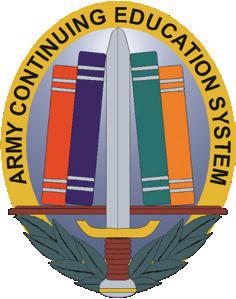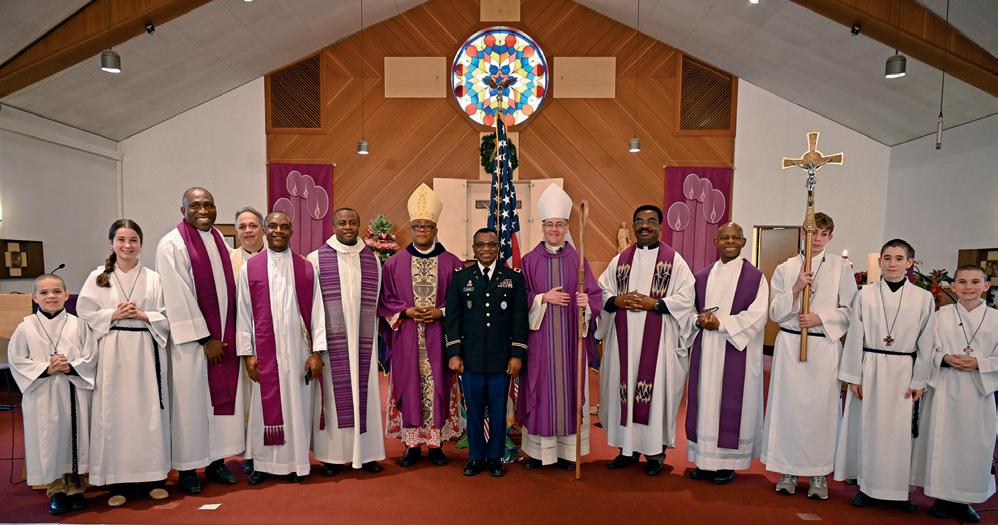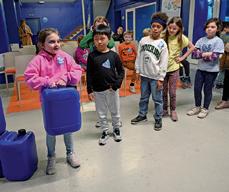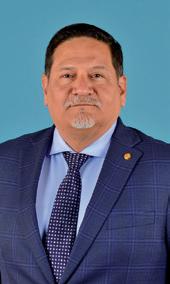






Happy New Year!
This new year brings the promise of new resolutions, new experiences, and new challenges.
The edition of the Citizen features stories highlighting the hallmarks of the new year.
For those of you who made resolutions, you’ll find ways to save more money, to learn German, and how to be more mindful of the words you speak.
We highlight some upcoming holiday celebrations, like Islam’s holy month of Ramadan and the German tradition of Fasching—a time of joy, humor, and a bit of mischief, where communities come together to celebrate and have fun.
In this issue, you can read about how Host Nation partners are reaching out to educate our students about where their drinking water comes from, and how our students are reaching for the stars through a direct downlink with the International Space Station on STEAM Night.
A few of our garrison chaplains also shine bright in our stories: one shows off his talents on the stage, and the other made history as the first African-born priest to achieve the rank of colonel in the entire Department of Defense.
Speaking of history, you can read about a German-born American army officer and how he helped turn the tide of the Revolutionary War, shaping the Continental Army into the disciplined and professional fighting force we now read about in textbooks.
Finally, I’d like to congratulate the USAG Stuttgart Safety Office. Because of their efforts, we were awarded the Army Materiel Command Exceptional Organization Safety Award for FY24 and received the Army Safety Excellence Streamer.
We hope you enjoy this issue and find inspiration in the stories of our community members' activities and accomplishments, as well as the garrison resources available to help you succeed in your goals. May these stories motivate you to engage, connect, and grow in the year ahead. Here’s to a prosperous and fulfilling 2025 for us all!




Cover image: A Narr (fool) playfully teases an onlooker during Stuttgart’s Fasching parade.

2 4 5 6 7 8 Commander’s Note Financial Readiness in the New Year Speak No Evil
Army Education Center Supports Community To Succeed in Education
Learning German as your New Year’s resolution
Fasching explained: Your guide to Germany’s fifth season
Chaplain’s Corner: Janus and the Journey Within
Ramadan: The Muslim Holy Month of Fasting
Deputy garrison chaplain earns historic promotion
Stuttgart Elementary School marks first field trips to Netze BW
From the Historian: Baron von Steuben: A Hero on Two Continents
Celebrating Innovation and Education at STEAM Night
11 MWR events to be excited about in early 2025
20 22 23 24 25 26 27
German VAT refund app rolls out to all eligible customers
LRC Stuttgart planner’s efforts help make operations more efficient
From Soldier to stage: A chaplain’s passion for theater
Employee Spotlight - Adrienne Roche - Donald Allman
Postal delivers big over holidays
Garrison Safety program earns major recognition
The Big Question: What is your word for 2025?

By Mackenzie Welsh USAG Stuttgart Public Affairs Practicum Student
One of the top 10 most popular new year’s resolutions is to save more money. But how can this resolution be carried out? Fortunately for the U.S. Army Garrison community almost everyone who lives or works on a Stuttgart military installation is eligible to meet with an ACS financial readiness counselor. For those living or working on a Stuttgart military installation, there’s good news: the Army Community Service (ACS) Financial Readiness Program offers invaluable support to help you achieve your financial goals.
Amy Melendez is one of the two ACS financial readiness counselors ready to get you started on the right financial path this year
“It’s simple things, from a teenager setting up a budget because they want to buy a prom dress to long-term retirement or wanting to be a millionaire,” Melendez said.
Along with this, ACS financial counseling is free of charge and entirely commitment-free—something rarely found with off-post financial services. Many civilian financial counselors come with hidden fees or attempt to sell specific financial products, which can create conflicts of interest. Moreover, off-post services often lack the expertise to address the unique financial circumstances of military life, such as tax-free income during deployments, unreimbursed moving expenses related to a PCS that can be claimed on a tax
return, or the intricacies of military retirement.
So how do you start saving more money this year?
Melendez suggests the first step is simple: set clear financial goals. Are you dreaming of more vacations? Saving for a new car? Planning for retirement or your child’s college education? Having a tangible goal to reach can make the reason for saving more real– and if you don’t know where to start, no problem. A meeting with a financial readiness counselor can help you clarify your priorities and develop a personalized plan to reach them.
Beyond financial counseling, ACS offers additional resources to support your financial well-being. The Army Emergency Relief (AER) program, for instance, provides interest-free loans and grants to service members facing unexpected financial hardships. Whether you’re dealing with car repairs, medical bills, or other unforeseen expenses, AER can be the lifeline you need to get back on track.




The Employment Readiness program is another service offered by ACS that can help you plan for your career development and help with interview and resume skills. These services complement the financial readiness program, creating a comprehensive support system for military families, Melendez says, adding that “every single program ACS has to offer impacts your finances and is part of your financial readiness.”
Christine Donovan, the director of ACS, highlights the flexibility of the financial readiness program. “You can sit down with somebody and maybe it’s 30 minutes or you’re going to come back a half a dozen times.” There’s no pressure or obligation. The goal is to empower you with the knowledge and tools to take control of your financial future.
While military life offers financial stability, thanks to steady pay and benefits, that security can sometimes lead to complacency. Melendez points out that some service members overlook long-term planning, assuming their financial situation will remain stable. But life can throw unexpected challenges your way: emergencies, PCS moves, or the transition to civilian life can strain even the steadiest budgets.
This year, make your resolution to save money one you actually keep. With the tools and resources available through ACS, achieving your financial goals is more than possible—it’s probable. And best of all, you don’t have to do it alone. So why wait? Start the new year by taking charge of your financial future today.

Commentary by Dayna E. Rowden
USAG Stuttgart Public Affairs
The new year often marks a time when we want to start behaving differently to improve ourselves. This year, I resolve to break myself of a bad habit, possibly one of the worst: gossiping.
In Judaism, the Hebrew term ‘Lashon Hara’—
meaning ‘evil tongue’—refers to speaking negatively about others without any serious intent to correct or improve the situation, even if the remarks are true. We are called to align our words with core virtues such as kindness, integrity, justice, and respect.
Words have the power to inflict great harm, from damaging someone’s reputation and causing emotional trauma to inciting social unrest. What
begins as harmless chatter, or even a snide comment on social media, can spiral into something hurtful because words can continue to hurt long after you are done speaking.
A saying goes, “Lashon Hara kills three: the one who speaks it, the one who hears it, and the one about whom it is spoken.” Gossip not only tarnishes the reputation of those it targets, but also brings into question the integrity of those who spread it.
Gossiping lures us in as a way to bond over shared complaints or even secrets, but, like many other bad habits, it often comes at a great expense—sowing the seeds of distrust, disrespect, and negativity. In this way, gossiping poses a threat to the peace and harmony we seek to uphold in our communities.
This year, I aim to be more mindful of my words. I resolve to use my voice to build people up rather than tear them down. Instead of focusing on others’ faults, I will celebrate their strengths. Instead of complaining, I will strive to create conversations that are uplifting, encouraging, and positive.
This resolution is not just about avoiding negative speech; it’s about using my words to nurture a community of respect and empathy. It’s about knowing the power of words and using those words responsibly. In this case, words are deeds.
As I take on this challenge, I hope to inspire others to consider the impact of their words and join me in fostering a culture of kindness.
Together, let’s make this year one of empathy, understanding, and positive connections. Here’s to a year of speaking with purpose and living with integrity.

By Marnessa Rea USAG Stuttgart Public Affairs Practicum Student
If you’ve told yourself 2025 is the year you get a degree or professional certification, you don’t have to go much farther than the Stuttgart Army Education Center on Panzer Kaserne. The Army Education Center is a comprehensive resource that helps Service Members of all branches – and anyone with Status of Forces Agreement (SOFA) status in the Stuttgart military community – reach their academic and professional goals.
The center provides various testing services, including language and Armed Services Vocational Aptitude Battery tests (ASVAB) and supporting programs like the Basic Skills Education Program, which is a refresher course covering both math and English taken to help raise general technical (GT) scores when retesting on the Armed Forces Classification Test (AFCT).
The center offers a one-stop shop for Service Members using tuition assistance and offers personnel testing services such as the Defense
Language Proficiency Test (DLPT), Defense Language Aptitude Battery (DLAB), Armed Forces Classification Test (AFCT), and the Selection Instrument for Flight Training (SIFT). Services such as the College-Level Examination Program (CLEP), DANTES Subject Standardized Tests (DSST), and the General Educational Development Test (GED) are offered as part of its designation as a National Test Center. Specifically, Service Members can combine all that the Education Center has to offer with their military education benefits (Tuition Assistance/TA, Government Issue Bill/GI Bill etc.) and come out of an assignment with a degree while still on active duty.
“We see a lot of Soldiers coming in whose parents never went to college and other siblings are going to college,” said Education Center Chief Jerrica Roach, adding that it’s not just about degrees and schools, but also assistance with the Free Application for Federal Student Aid (FAFSA) and other financial assistance.
The center hosts various institutions holding face-to-face and online classes (which can be taken alone or as part of a full degree program), as well as a computer lab and rooms for testing and counseling. Stateside universities offering services include Embry-Riddle Aeronautical University and the University of Maryland Global Campus (UMGC).
Although the center’s primary target audience is Soldiers, especially younger Soldiers looking to advance their careers, anyone interested in education, including high school students, spouses, and dependents can use its resources regardless of rank.
USAG Stuttgart Command Sgt. Maj. Chris Melendez personally used education centers in other military

communities to test out of classes using CLEP exams and earn his master’s degree while serving at Fort Liberty, North Carolina.
“The better educated we are, the better prepared and trained we are, holistically,” Melendez said. “I think education benefits society as a whole.”
Melendez, who went on to complete a doctoral degree, emphasizes that the Army has excellent ways for one to either start their educational journey, go back and finish, or continue to pursue education.
“From a [non-commissioned officer] perspective, the importance of education has evolved,” he said. “Pursuing a degree allows you to increase time management, communication skills, writing skills, presenting skills, and become more comfortable with different forms of media which then all come together to seep into aspects of how you perform your work. Our community becomes fuller as we gain a cohort of people that are better informed, can communicate, and can manage their time.”
The Education Center supports that goal by aiming to provide the best customer service, serving as an invaluable resource to Service Members, family members, and civilians in the Stuttgart community, Roach added.
The center actively engages the community throughout the year, with its marquee promotional campaign coming during National Education Week each November. That’s when you’ll find their staff visiting the PX, commissary, and other locations to spread awareness of the breadth of tools, support, and educational investments they offer to the community.
Education extends far beyond the classroom, offering lasting benefits that accompany you throughout life. It’s “an investment in the human, in the person, that no one can take away,” Melendez emphasized. If you’re committed to advancing your education in 2025, the Stuttgart Army Education Center is the perfect place to start your journey.
The Education Center is located on the fourth floor of Building 2915, Panzer Kaserne. For more information, or check out their website at https://home.army.mil/stuttgart/education-center.
By Balmina Sehra
USAG Stuttgart Public Affairs
This year, why not embrace the challenge of learning German? It’s a great way to enrich your time while you’re on tour and learn more about the culture, enhancing your social life. So, as you consider your resolutions this year, think about the possibilities that come with speaking German.

One of the hardest things is always taking the first step. It can be that much more difficult to get your motivation if you don’t even know where to start. To make your journey to learning a new language much easier we have all of the places and classes you can learn German listed below, so there are no more excuses!
Army Community Service (ACS) offers the following tours and classes: Host Nation Orientation

Perfect for anyone new in Stuttgart, especially if this is your first overseas move. Host Nation Orientation will help you learn about German customs and culture and teach you some basic German phrases.
Host Nation TourStuttgart
Want to experience a more intense cultural deep dive? Then the Host Nation Tour will give you just that. You get to learn about German customs and culture, learn some basic phrases in German, as well as how to use the public transportation and get a walking tour of the local community. German Immersion class
Learning about the German language and culture can make your stay in the Stuttgart area more enjoyable. Free immersion sessions with an experienced instructor at ACS welcome participants at all levels of understanding.

Although not a language class, you can also take part of the German supermarket tour. Learn to navigate a local supermarket to compare products and make healthy choices within your limited budget.
Interpret German food labels for nutritional information, common allergens, and additives.
Please register in advance. For more information please visit: https://stuttgart.armymwr.com/calendar
You can also visit the Welcome Stuttgart website at: https://service.stuttgart.de/lhs-services/ dks/de and check out the courses they offer. They offer German classes for all different levels at different locations in Stuttgart. If you’re interested in taking a class you can see which classes would suit you best.
Another place you can visit for classes is your local adult education center, or Volkshochschule (VHS). Similar to community colleges in the U.S., VHS offers German classes for adults at locations throughout the Stuttgart metro area. There are classes scheduled for both daytime and evenings. Classes are offered in Stuttgart, Leonberg, Böblingen-Sindelfingen, LeinfeldenEchterdingen, and more.
Helpful tips from a local:
German can be a little tough to learn, however it is not impossible. To give you a little taste of the language, here are some phrases you can practice and start using in your everyday life:
German greetings
Good morning, day, evening - Guten Morgen, Guten Tag, Guten Abend
Good night - Gute Nacht
My name is - Ich heiße
What is your name?
- Wie heissen Sie? What is …? - Was ist …?
Ordering food in a restaurant
I would like …
- Ich möchte …
I would like to pay
- Ich möchte bezahlen
Do you speak English?
- Sprechen sie Englisch?
I would like to pay
- Ich möchte bezahlen
The bill please
- Die Rechnung bitte May I pay with card?
- Kann ich mit Karte bezahlen?
Asking for directions: Where is …? - Wo ist …? Where is the station?
- Wo ist der Bahnhof?
Asking for assistance: Can you help me please? - Können Sie mir bitte helfen?

























A lot of Narren costumes are very colourful and although some may be very scary not all of them are. Some are just a little goofy looking and playful like these two.

By Balmina Sehra USAG Stuttgart Public Affairs
Some of you may have already heard of Fasching. Also known as Karneval or Fastnacht (mainly used in the northwest of Germany), is a festival celebrated across Germany for what is often referred to as Germany’s unofficial ‘fifth’ season.
From Nov. 11 at exactly 11:11 a.m. until Ash Wednesday the following year, cities and towns across the country celebrate Fasching with parades and parties, dress up in costumes, and eat lots of candy. The celebration is a time for people to let loose, disconnect from their everyday life and forget the worries of the world.
One of the most important roles in Fasching festivities is held by the Narren, or fools with their mythical looking costumes. They can take the form of witches, devils and demons to entertain the crowd during parades with funny antics, performances and teasing.
The traditions of Fasching can be traced back 5,000 years and are rooted in ancient Mesopotamian festivals that emphasized equality amongst all participants. This sense of equality, regardless of social standing, was quite unusual for the times. By medieval times, the concept evolved into the Narrenfeste, or festival of Narrens, where people of all classes came together to celebrate and make fun of societal norms. During these celebrations, the Narr embodied the idea of turning the world upside down, challenging authority and societal conventions by acting like a fool, joking and jesting at all times and disregarding any kind of authoritative figure.

The Narr symbolizes human foolishness and ignoring societal rules even if it’s only for a short period of time.
It is no coincidence that the end of Fasching marks the beginning of the Christian Lent, a time period in which Christians practice restriction. The Narr represents a break from religious norms and highlight the importance of letting yourself indulge in worldly pleasures.
One of the most important traditions for any Narr is the ritual of ‘dusting off’ their costume, known in German as Häs abstauben. This highly valued ceremony amongst the Narren officially marks the beginning and the end of the Fasching celebrations. Since costumes are not allowed outside of the Fasching period, they are stored away and taken out with a great deal of care and carefully dusted off. Once the Fasching period has ended, they are meticulously prepared to stow away again until the following year.
Attending a Faschings parade is different from other parades you may be used to as the Narren can be quite mean. Expect to be pulled into the parade and to be teased a lot. And be careful when wearing a hair tie. Some of the Narren will pull it out of your hair and never give it back to you.
If you would like to attend a Fasching parade and experience the Narren up close, then make sure to check out the Stuttgart Fasching parade on March 4. Other notable celebrations in the region include Schömberg, Weil der Stadt, Rottweil, Heidelberg, and Basel.













By Chaplain (Col.) Stephen McDermott USAG Stuttgart Catholic Community Priest
Friends, January is upon us! The word itself comes from the Roman god, “Janus”… the god with the two faces; one looking forward and the other looking back. Traditionally this is the time of year when we look back at the year that has now come to a close in order to reflect on how we did; the good, the bad, the ugly. Socrates himself said “The unexamined life is not worth living.”
This is nothing new… professional athletes often watch videos of past games to see what they did well, and what needs to be approved. Businesses often examine the past as well, to see how they can better their productivity and revenue. Even actors in the theatre will look at past performances to evaluate themselves. Of course, this is nothing new to us in the Military. We have our AARs & Hot Washes.
While deep down we know the importance of such an evaluation, the question that always hits me is, “Why do we only seriously do this at the beginning of a New Year?”
Shouldn’t this be an endeavor that we practice often? In the Christian Tradition, we are encouraged to do this every night before going to bed, it is called an ‘examination of conscience.’ It is a time whereby we look back on the day just past and ask the questions: what did I do that was good… what could I do better… did I give Glory to God – or just to myself?
Human experience teaches us that holding up a “Spiritual Mirror” and seriously / honestly taking a look at ourselves will bear many wonderful fruits in our personal life. But for the scrupulous person, this exercise in self-reflection can have a negative effect as well, as they will only focus on their “Misteaks” – and often they will do this with laser precision. This in turn can lead to a distorted image of one’s self, causing the individual to fall deeper into self-loathing or even depression. Reflecting on the danger of this self-abasement, Pope St. John Paul II the Great wrote: “We are not the sum of our weaknesses and failures, we are the sum of the Father's love for us and our real capacity to become the image of His Son Jesus.” It is important that we never lose sight of who we truly are… first and foremost a “Child of God” – and it is He who has loved us into existence and whose providence sustains us every day. Through His daily Graces which permeates us, we can grow in goodness and holiness.
As we move forward into this New Year of great possibilities, let us hold up that Spiritual Mirror every night before bed and ask our Lord to help us see ourselves for who we truly are… to see ourselves as He see us. For to see the world as God sees it (as it truly is)… is sanity. To see the world (and myself) in any other way would be quite… insane.

























Story and photo by Qazi Iftikhar Distinctive Religious Group Leader, USAG Stuttgart Muslim Community
U.S. Army Garrison Stuttgart has around 30 families practicing Islam and observing Ramadan, the ninth month of the Muslim calendar and the holy month of fasting.
Because the Muslim calendar year (Hijri calendar) is shorter than the standard Gregorian calendar year, Ramadan begins 10 to 12 days earlier each year, allowing it to fall in every season throughout a 33-year cycle.
This year, Ramadan is expected to begin on the evening of Friday, Feb. 28 and will last until the evening of Saturday, March 29. The exact dates may vary slightly depending on the sighting of the crescent moon, which is used to mark the beginning and end of the holy month.

During Ramadan, Muslims observe a strict fast from dawn until sunset. They are not allowed to eat or drink (even water) during daylight hours. Fasting
is a private act of worship and a form of spiritual discipline to bring about nearness to God and to empathize with those less fortunate.
The fast is broken at the end of the day with prayer and a festive meal called an Iftar. It is customary to visit family and friends following the Iftar.
During Ramadan, many Muslims go to the mosque and spend several hours praying. In addition to the five daily prayers that are part of the core of Islam, Muslims also recite a special prayer called the Tarawih prayer (night prayer).
On the evening of the 27th day of Ramadan, Muslims observe a special night called Laylatal-Qadr, sometimes referred to as the Night of Power. It is
Copies of the Quran displayed on the day of Eid al-Fitr, marking the end of Ramadan and the month-long period of dawn-to-dusk fasting.
believed that Muhammad (peace be upon him) first received the Holy Qur’an on this night.
Eid al-Fitr, the Festival of Breaking the Fast, celebrates the end of Ramadan. On that evening, friends and families gather for festive meals and exchange gifts and give special gifts to those in need. It’s a time of gratitude and celebration for the strength and spiritual growth gained during the month.
The USAG Stuttgart Muslim Community will host Eid al-Fitr prayers and breakfast on Kelley Barracks on March 31. For more information about this event and the USAG Stuttgart Muslim Community, please contact Mr. Qazi Iftikhar at Qazi.m.iftikhar. civ@mail.mil.







Story by Margarita Cambest
Photos by Dayna Rowden USAG Stuttgart Public Affairs
Chaplain (Col.) John Ijeoma felt a spiritual call to serve when he was only 7 years old.
Now the deputy command chaplain at U.S. Army Garrison Stuttgart, he’s spent the majority of his 61 years sharing the Catholic faith with others as a priest. This month, he became the first Black priest in the U.S. Department of Defense to be promoted to the rank of colonel.

“I finished my elementary school at the age of 11, but by the time I finished, I didn’t know anything about how to become a priest.” he said. “I told my parents this is what I wanted to do, and they helped me sign up for the exams and prepare.”
USAG Stuttgart Command Chaplain (Col.) David Curlin read the orders to promote Ijeoma to his new rank at the Catholic Mass service held on Patch Barracks Dec. 8.
Bishop William Muhm, auxiliary bishop for the Archdiocese for the Military Services, USA, conducted the Mass to a packed house and later joined Bishop Thomas Obiatuegwu, the auxiliary bishop of the Orlu, Nigeria diocese (and a former U.S. Army Chaplain himself), to pin eagles on Ijeoma’s uniform.
“The intent is to have a coordination between the Nigerian chaplaincy and the United States,”
Father John Ijeoma said.
“Father John Ijeoma is a man of exceptional character whose humility, joy, and selfless service are matched only by his remarkable ability to connect with people of every background – young and old, Black and white, high and low,” Curlin said. “His equanimity and effective communication make him a tremendous asset to Holy Trinity Parish, just as he has been to the Soldiers he has faithfully served throughout his distinguished career.”
Ijeoma entered minor seminary at the age of 12, and after completing middle and high school, he went straight into major seminary, a Roman Catholic theological college that prepares men to be priests. In 1988, he was officially ordained into the Catholic priesthood. The path was a traditional one for many who choose to serve as priests in the Catholic faith, but Ijeoma, who was born in Aba, Nigeria, did not necessarily take a traditional path to the Army chaplaincy.
After almost 10 years of working in parishes across Nigeria, he was recruited in 1997 to work in the Diocese of Lake Charles, Louisiana, by a friend who thought he might be a good fit. It’s there that he found he was intrigued by the prospect of serving those in uniform, so he started asking Service Members he encountered at the airport or elsewhere about the breadth of the religious services offered by the military. Eventually, he connected with a recruiter at the local mall who passed him onto a recruiter from the U.S. Army Chaplain Corps.
“It was a little tough because I asked for permission three times before getting a yes, but I eventually told the bishop the Army was my passion and I needed to join, or I’d go back to Nigeria,” Ijeoma said. Rather than lose Ijeoma’s impact on Catholics in the United States, the bishop agreed to let him commission into the Army, and he began his military service in 2004.
Since then, he’s been assigned to duty stations in South Carolina, Washington state, Kansas, Belgium, South Korea, and Stuttgart, Germany where he’s been stationed since 2019 other than a seven-month assignment in Wiesbaden. He has three deployments under his belt and has been awarded two Bronze Stars, three Meritorious Service Medals, and three Army Commendation Medals. Two of his deployments
resulted in Meritorious Unit Citations being awarded to units in which he served.
Most recently, he’s helped lead contingents of African-born chaplains to Nigeria in support of U.S. Africa Command (USAFRICOM) missions, coordinating with other chaplains and religious leaders and leading an invocation for a Marines Corps birthday celebration.
“She knows I come from Nigeria and know about the culture,” he said about USAFRICOM Command Chaplain (Col.) Karen Meeker’s decision to include him and other African-born chaplains in delegations, adding that he’s hoping to make more trips in the future. “The intent is to have a coordination between the Nigerian chaplaincy and the United States.”
After 20 years in the Army, Ijeoma planned to head into retirement this coming January to enjoy some hobbies and spend more time with his mother and extended family in Nigeria. However, he was called on to reconsider because of a shortage of priests in the Army and locally here in Stuttgart.
“If I’m strong enough and the military lets me, I love being an Army chaplain, and I’ll be glad to help as much as I’m required,” he said.

and
by Margarita Cambest USAG Stuttgart Public Affairs
Stuttgart Elementary School third graders got a chance to learn all about the water cycle at a special trip to the Münster Waterworks this school year.
In a typical year, more than 2,000 school children come through the doors of the water treatment facility and teaching museum in Stuttgart. The field trip, a first of its kind for military-affiliated kids from U.S Army Garrison Stuttgart, has been a right of passage since 2009 for students who attend local host nation schools. Netze BW Wasser staff work with children to engage them in hands-on learning that teaches life lessons they can bring home to their families,

Stuttgart Elementary School students take part in a water experiment at the Netze BW Wasser teaching facility on Nov. 15, 2024.
says Bettina Reutter, the facility’s public relations manager. The company is responsible for the distribution of drinking water throughout the entire Stuttgart metropolitan area, as well as monitoring and quality testing of the drinking supply.

“Our people make sure the water is secured and controlled, but we want to tell the kids the story of water and how it gets into their glass,” Reutter said.
Through a tour of the teaching facility, students learn how the water cycle works, why it’s important, and leave with a greater understanding of how to protect our limited natural resources, she said.
After a tour, students went on to learn about the process of getting clean water into their homes through a science experiment led by a Netze BW staff member.
First up, a filtration experiment where students removed sediment from brown, brackish water by straining it. While the water got a little clearer, it was still an unappealing shade of brown, so students used 10 drops of water purification solution to clean
it up some more. When asked if anyone would drink the water at that point, the answer was a resounding “no”— but there was still work to be done.
From there, a second filtration with cotton and pea gravel helped remove smaller impurities before a final filtration with activated charcoal led to something that looks much closer to what most of the students said they expect of clean drinking water.
“It’s a wonderful opportunity for our students to come here and learn about the entire process of filtering water from nature to tap,” says
Krista Nightwine, a third-grade teacher at Stuttgart Elementary School, who accompanied her students on the school’s second trip to the facility. “The staff worked so well with the students in engaging them on hands-on learning and that later ties into the education they’re getting in the classroom.”
Stuttgart Elementary School students learn about the water supply at Netze BW Wasser on Nov. 15, 2024.


By Col. Christopher Libertini, U.S. Army Reserve Office of the Command Historian, U.S. European Command
This coming spring will mark the 250th anniversary of the start of the American Revolution in 1775. As luck would have it, Patch Barracks has its own connection to that historic era in the form of Friedrich Wilhelm Baron von Steuben, whose name is associated with the flag officer housing area on post that is more commonly known as Florida Strasse. The most immediate thoughts concerning this Revolutionary War hero might be of how he drilled the wearied Continental Army into a professional fighting force at Valley Forge in 1778. While

this association would be correct, few might know the real-life story of this legendary figure. If it is true in military affairs that no plan survives first contact with the enemy, it is similarly true that an individual’s best laid plans for life seldom come to fruition. This was the case for von Steuben who never realized the army career for which he longed but nonetheless after numerous twists and turns in his life achieved something of far greater significance, saving two countries—Germany and the United States.
Even had he wanted to, it probably would have been impossible for von Steuben to escape his destiny to be an army officer. He was born into the Junker class, the lower rung of Prussian nobility that provided the core of military officers. His father served as an engineer captain in the Prussian army, and the two godfathers for his christening when he was an infant were Colonel Gerhard Cornelius von Walrave, the highest-ranking artillery officer in the army, and none other than King Friedrich Wilhelm I, the father of the modern Prussian army. In fact, von Steuben was named after the Prussian monarch. At age 16, von Steuben joined the army and, as was typical for someone of his social class, served for six years as an officer cadet, the mandatory training before qualifying for a commission. Already displaying the ambition that would remain with him throughout his life, he opted for service in the infantry, which he felt offered greater opportunities for advancement. During his time as a cadet, he honed his skills at drilling and tactics while working closely with the enlisted soldiers. This prolonged period of apprenticeship common among cadets helped forge enduring bonds between the enlisted ranks and officer corps that helped to make the Prussian Army so formidable.
In active service during the Seven Years’ War, von Steuben showed real talent as an infantry officer. He served bravely and was wounded multiple times, often fighting in battles where the Prussian army was outnumbered. Later in late 1761, he was taken prisoner when the army he was serving with

surrendered during the siege of Treptow, known today as Trzebiatów, Poland. After the war ended, King Frederick set up a general staff school that he would teach himself, and von Steuben, who had returned from captivity, was among the promising young officers selected to attend. It was a great honor. He was 31 years old, recently promoted to captain, and on a fast track to becoming a general. His life’s dream seemed within his grasp, but then the unthinkable happened. Somehow von Steuben ran afoul of a well-connected classmate and was dismissed summarily from the school and, soon after, the Prussian military. After spending a year unemployed, he landed a position at court in one of the numerous small German principalities of that era, serving as a court chamberlain, or Hofmarschall, for a minor German prince who ruled HohenzollernHechingen located just south of Stuttgart and where people can visit the Hohenzollern castle today. It was while serving in this role that he received the honorary title of Freiherr, or free lord, otherwise translated in English as baron. He would keep this title for the rest of his life.
By 1775, he began looking for a military position again, but despite the influential people he had met at court over the years who recommended him for various assignments, nothing came to fruition, including opportunities with the British East India Company and with the French and Austrian armies. Then, two years later while visiting Karlsruhe he had a chance encounter with an English cartographer, Peter Burdett, who at the time was serving as an agent for Benjamin Franklin, the American ambassador to France. Franklin was in
Paris to seek aid for the 13 colonies that were in an open rebellion against Great Britain. In addition to money and weapons, the colonists needed experienced military officers. Traveling to Paris to secure a post in the Continental Army, von Steuben met with Franklin, who was thoroughly impressed by von Steuben’s military training, experience, and personality. Although Franklin could not promise von Steuben a direct commission, he was able to write him a glowing letter of introduction to General George Washington, who commanded the Continental Army. With this endorsement, von Steuben made the voyage across the Atlantic at a time when Washington’s Army faced an existential crisis. Smarting from battlefield losses and unable to prevent the British capture of the fledgling nation’s

“The March to Valley Forge,” an 1883 painting by William B. T. Trego, depicts General George Washington leading the Continental Army to Valley Forge in December 1777. Von Steuben would arrive to provide training two months later.
at Valley Forge into a disciplined, effective fighting force that could meet the British army in pitched battle on equal terms. What von Steuben did at Valley Forge is indeed the stuff of legend. Not knowing English, he drilled the soldiers hard, often profusely cursing in German or French—which then had to be translated—whenever the soldiers made a misstep. His flair for theatrics tempered with a clear concern for the wellbeing of his troops quickly endeared him to the enlisted soldiers. He simplified the Prussian drill for loading and firing weapons while also training the soldiers for how to form and maneuver at battalion and regimental levels until they were at least as proficient as their British adversary and perhaps even better.
capital at Philadelphia, the army of only 11,000 men retreated 20 miles away to Valley Forge where it made a hasty encampment to ride out the winter of 1777 to 1778. Cold, hungry, poorly equipped, and on the verge of defeat, the army faced its darkest hour.
This Continental Army that von Steuben met at Valley Forge in some ways shared attributes with that of the Prussia army, which by the eighteenth century was undeniably the best army in Europe and more formidable than even that of the British and French. Compared to its peers, Prussia’s military was small and frugally equipped and uniformed—reflective of the limited resources and parsimonious inclinations of the Prussian crown that ruled a realm with some of the poorest farmland in all of Germany. Foreigners included two-thirds of its enlisted ranks. Much the same could be said of the Continental Army during the winter of 1778. It was small, poorly equipped, insufficiently supplied, and made up of soldiers hailing from different colonies. What set the Prussian army apart and propelled it into a class by itself, however, was its discipline, precision, toughness, and professionalism that no peer military could match. Its officer corps was the linchpin for the Prussian system. They were extensively trained and fiercely loyal. They took seriously their charge to instill among their troops rigid discipline and precision with drill and tactics. At the same time, they were to show clear concern for troop welfare and wellbeing. This transformed ordinary soldiers into extremely proficient, highly motivated warriors willing to take bold action on the battlefield under the aggressive leadership and command of their officers. It was the personal mission of von Steuben to inject these same attributes into the Continental Army after Washington commissioned him as Inspector General. Newly arrived in America, von Steuben was suddenly now a key person on which the fate of the Continental Army rested. He did not disappoint. In the span of three months, von Steuben transformed the dispirited troops he found

Von’s Steuben’s diligent efforts soon yielded results on the battlefield, and he himself was given command of key elements of Washington’s Army in its subsequent campaigns. He later participated in the climactic battle at Yorktown, leading one of the four main elements of the combined American-French army. Fittingly, it was the troops under his command that received the initial flag of surrender from the British on Oct. 17, 1781 that in essence ended the war. Peace brought with it calls to disband the Continental Army, but von Steuben became an early and strenuous advocate for maintaining a standing army, as he believed reliance upon state militias would not allow the new nation to defend itself adequately against a future invasion by a major European power. It was largely his vision, too, that gave rise to the U.S. service academies, starting with the Military Academy at West Point. Following the war, von Steuben retired to a large estate in Utica, New York, which he received as part of his compensation and pension for his wartime service. He would spend his summers there and winters in New York City. Despite his heroic and adventurous life, Baron von Steuben died on Nov. 28, 1794 in relative solitude, and his remains were buried without fanfare on his estate. Today, a large granite monument marks his final resting place.

While his grave may receive few visitors these days in part because of its somewhat remote location in the Mohawk Valley, about 240 miles northwest of New York City, the legacy of this great man undeniably lives on in the two democratic republics that he helped to save. Over two and a half centuries ago, Germany in the person of Baron von Steuben came to the aid of the United States as it fought desperately to defend its newly declared independence. Today, U.S. service members return the favor, as they serve at Patch Barracks and other installations across Germany to defend that country’s post-World War II independence and democratic institutions. During World War I, U.S. service members fighting in France famously proclaimed, “Lafayette, we have returned,” to acknowledge their repayment of debt for services rendered by the French Marquis de Lafayette to the colonies during the American Revolution. Today, U.S. service members stationed in Germany could equally declare and perhaps with more justification, “Baron von Steuben, we have returned.”


By Nano Betts Stuttgart Family and MWR Marketing
Photos courtesy Stuttgart Family & MWR Marketing
Welcome the New Year with excitement and explore these fresh opportunities brought to you by Family and MWR. Get ready to fill your schedule with exciting community events that promise to bring joy and leave you and your family thinking, “I’m glad I live here!”
Don’t miss the 2025 theatre season and the upcoming exhilarating stage productions:
Silver’s Secret: This goofy pirate play is a treasure chest full of silliness with cheerleader mermaids, ghosts, smugglers, and lobsters as comic stagehands! Performances: Feb. 1 and 8 at 2 p.m. and 4 p.m.; Feb. 2 and 9 at 2 p.m.; Feb. 8 at 2 p.m. is a private performance for EFMP. EFMP members should contact ACS for Ticket Information for this performance. Cost: Adults $10 and Students $8. Tickets go on sale Jan. 21 at 12:30 p.m.
A Gentleman’s Guide to Love and Murder: Expect a murderous romp filled with unforgettable music, non-stop laughs - a truly original and fresh new comedy. Performances: March 7, 8, 14, 15, 21 and 22 at 7:30 p.m.; March 9, 16 and 23 at 3 p.m. Cost: Adults $20 and Students $15. Tickets go on sale Feb. 25 at 12:30 p.m.
Puffs: It is the untold story of the underdog house at a certain magic school—where badgers are brave, the stakes are low, and staying out of danger is the ultimate goal. Performances: May 16, 17, 30 & 31 and June 6 and 7 at 7:30 p.m.; June 1 and 8 at 3 p.m. Cost: Adults $18 and Students $13. Tickets go on sale May 6 at 12:30 p.m.
Contact Stuttgart Theatre Center: CIV 0711-729-3055. Website: https://stuttgart.armymwr.com/programs/stuttgarttheatre-center
Join one of the exhilarating courses offered by our Outdoor Recreation team to learn new skills that will last you a lifetime:
Bushcraft Basic Skills: Develop a series of bushcraft basic skills through multiple courses designed to build personal confidence and self-reliance in a fun, relaxing natural environment. When: Feb. 8, 9 a.m. to 1 p.m. Where: Local Training Area near Panzer Kaserne. Cost: $125 per person. Ages: Adults and 14+, Twelve and 13-year-olds may participate if a parent also participates.
Kids’ Survival Course 2.0: This course is the perfect opportunity for your kids to learn how to accurately determine cardinal directions, navigate at night by using stars in the sky and use basic signaling techniques in an emergency. When: Feb. 14, 9 a.m. to 2 p.m. Where: Advanced Mobility Course (AMC). Age: 8+ years old. Cost: $125 per child.
Land Navigation / Basic Orienteering: Learn the basics of land navigation, discover how to read and plot points on a map, and determine the correct azimuth to navigate to a number of endpoints. When: March 22, 9 a.m. to 3 p.m. Where: Local
Training Area, Area 3 (near Panzer Kaserne, detailed map will be given upon registration). Cost: $125 per participant. Age: Minimum age to participate is 12+. Children, adults, and families are welcome. Call or visit Outdoor Recreation on Kelley Barracks to register by March 7.
Snow Fort Adventure: Escape into the heart

Immerse yourself in a unique Swiss Alps adventure: cozy up in a snow fort at 6,561 feet and trek through pristine landscapes with expert guides, all in one exhilarating weekend.

of the Swiss Alps for a one-of-a-kind weekend getaway! Build your own snow fort and sleep under the stars, followed by another relaxing night at a mountain lodge at 6,561 feet. Marvel at breathtaking alpine views and explore the pristine winter wonderland with expert mountain guides. Dates: Nov. 7–9 & Nov. 21–23. Requirements: Mountain Search & Rescue insurance, packing essentials, and a love for high adventure. For ages 12+ (with parent) or 18+ solo. Limited spots (5–9 participants). Call Outdoor Recreation to sign up today! Cost: $1,500/person.
Contact Outdoor Recreation: CIV 09641-70-596-4291.
Get ready to tailgate indoors! Join us on Feb. 9 at 10 p.m. for some football fever at our LIX Blitz & Bowl event hosted by the Galaxy Bowling & Entertainment Center. Your admission includes LIVE game viewing on numerous screens, prize drawings, shoe rentals, and unlimited bowling. Prost on Post will have drink specials to celebrate the night too! Cost: Early Bird tickets $20 (Jan.15 to Feb. 2). No refunds after Jan. 31. Same-day tickets $25. Visit Galaxy Bowling & Entertainment Center to purchase your tickets.
Contact Galaxy Bowling & Entertainment Center: CIV 07031-15-2719.
Do you have teens looking for exciting and engaging activities? Our Army Community Service is just the place for them! Join us at Dodging Trouble & Catching Feels on Feb. 12 for a friendly game of dodgeball and discussions about healthy relationships, consent, and assertive communication to learn valuable skills and insights. Register by Feb. 10. We’ll also host Tai Chi on March 12 which is perfect for teens looking to relax, reduce stress, and improve overall well-being. This event will take place on Panzer Kaserne, at the Panzer Youth Center. Register by March 10.
Contact ACS: CIV 09641-70-596-3362.
Our spring flea market promises an exciting day of bargains as you browse through a diverse array of items, from unique crafts to vintage finds. When: March 15, 10 a.m. to 2 p.m. Where: Panzer Kaserne, Bldg. 2917. Cost: For sellers, $25 fee for fest table space and ample space to display your merchandise. For buyers, no admission fee or cost to attend. Registration: Call or visit Outdoor Recreation to reserve your table.
Contact Outdoor Recreation: CIV 09641-70-596-4291.
Explore more of Europe with MWR Tours. Take advantage of the special offers for these exciting destinations this spring and summer.
Amsterdam, Netherlands
April 11-13, 2025
Visit the most famous flower parade of the Netherlands as well as the tulip gardens of Keukenhof. The cost includes roundtrip airfare, three days and two nights at a four-star hotel in Amsterdam, daily breakfast, roundtrip airport transfer in Amsterdam, entrance ticket to Keukenhof Garden, bus transportation to/from Keukenhof, the 78th Dutch Flower Parade and free time.
Î Cost: Double Occupancy: $1,500 per person. Single Occupancy: $1,875 per person.
Î Child aged 3: $1,250 with two paying adults, no seat on the plane, and on existing bedding.
Î Child 2 & under: $315 with two paying adults, no seat on the plane, and on existing bedding.
Memorial Day Weekend in Dubrovnik, Croatia
May 23 - 26, 2025
Book a trip to the “Pearl of the Adriatic.” Dubrovnik, a city in southern Croatia fronting the Adriatic Sea, is one of the best-preserved medieval cities in the world, complete with large, intact outer walls. It’s also known for its distinctive Old Town, encircled with massive stone walls completed in the 16th century. The cost includes roundtrip airfare, four days and three nights at a four-star hotel with
views of the ocean and beach, daily breakfast, airport to hotel transfer, two to three-hour guided city tour of Dubrovnik including the City Wall, and a four-hour boat tour to the Blue Cave.
Î Cost: Double Occupancy: $1,800 / Single. Occupancy: $2,200. Child aged 3-17: $1,750, Child 2 & under: $350, sits on a lap on the plane, and is not allowed on the boat tour.
For full details, pricing and itineraries of these trips, visit our website or call MWR Tours. Contact MWR Tours: CIV 09641-70-596-2104.
Ready to meet your match?! Meet us on the court and your favorite Pickleball Pros as they show off their skills and teach your new techniques. Stop by Panzer Fitness Center, assemble your team and get ready for some friendly competition with the Pro Pickleball Tour, presented by Armed Forces Entertainment. Date: Saturday, March 15.
Î 09:30-10:15 a.m. - Skills Clinic (Kids, ages 8-15)
Î 10:15-11:30 a.m. - Skills Clinic (Adults, ages 16+)
Î 1 p.m. - Exhibition Game (Single)
Î 1:30 p.m. - King of the Court - Pros vs. Joes (Doubles)
Î Children can register for the Skills Clinic with CYS-Youth Sports. Event is subject to change.
CIV 09641-70-596-3516/CIV 09641-70-596-3516/2886
Don your festive green outfits, grab your lucky shamrock and join the most exciting run of the season – the Leprechaun Lauf 5K Fun Run! Mark your calendars: the race starts at 9 a.m. March 15 in front of the Swabian Community Activity Center, Patch Barracks. Preregistration (Jan. 28 to Feb. 28): $20; same-day registration: $25. Register at any USAG Stuttgart Fitness Center or online via WebTrac. Bring your friends, family and plenty of Irish cheer for a morning of fitness, fun and community spirit! See you at the starting line!
CIV 09641-70-596-2724.
Spend your Friday night with charttopping country artist, Niko Moon who will be bringing you a good time with uplifting music on Friday, March 21 at Panzer Fitness Center. Grab your friends and get ready for “Better Days.” Presented by Armed Forces Entertainment. Free and open to all authorized Family & MWR patrons and their escorted guests. Event is subject to change.

For more information visit our website
They say shopping is the best cardio and if that is true, then our Spring Bazaar will be the most exciting exercise you’ll do all season. Expect 70+ vendors visiting from all over Europe. Food and beverages will be available for purchase from Private Organizations and Soldier and Family Readiness Groups. Don’t miss this opportunity to indulge in four days of leisurely shopping surrounded by the finest vendors this continent has to offer. Dates: May 1 to 4. Location: Panzer Fitness Center and Parade Field (tent), Panzer Kaserne.
Contact: CIV 09641-70-596-3516/2299.
Join us on April 26 from 10 a.m. until 2 p.m. for a celebration of youth talent and diversity at the annual CYS Spring Fest! Celebrate the Month of the Military Child with an unforgettable day honoring the unique talents, creativity and athleticism of our youth! Highlights will include youth performances, art exhibitions, athletic demonstrations, SKIES demonstrations, community talent spotlights, and more! This event is about celebrating our children and youth while building stronger connections through the arts, athletics, and shared experiences. Whether you’re performing, participating, or just enjoying the day, there’s something for everyone! Location: Panzer Kaserne – Parade Field.
For more information: CIV 09641-70-596-7464.
























By Stefan Alford U.S. Army Installation Management Command-Europe
Following the successful completion of a pilot program that began early last year, enrollment in a mobile app that allows U.S. military personnel to digitally consolidate small purchase receipts onto one value-added tax (VAT) form each month is now available to eligible personnel in Stuttgart and across Germany.
This new VAT program was developed through an agreement between U.S. Army Installation Management Command-Europe (IMCOM-Europe) and NOVAT GmbH, the company that developed and manages the app, called Remonon. Over the first eight months of the pilot, IMCOM-Europe worked with host nation officials and NOVAT to improve the app’s interface and functionality. In that time, roughly $150,000 was returned to customers, or an average of $91 of taxes per household, per month, according to officials with IMCOM-Europe, which oversees the VAT program in Germany.
The pilot allowed the developer to make minor modifications to the app and has been an overall success, with both VAT offices and customers excited to have this additional program available to them, said Jeff Wertz, assistant chief of staff for Family, Morale, Welfare and Recreation at IMCOM-Europe.
As of January 2025, all U.S. forces-affiliated personnel eligible for VAT relief in Germany can now use the app. Customers can download Remonon at the App Store or Google Play and can visit a garrison VAT office to sign up for an Individual VAT Number (IVN), which is required at registration.
The micro-purchase app allows customers to obtain easy tax relief on small, everyday purchases for which the current VAT system is not practical. As an example, someone spending 15 or 20 euro for a purchase at a German vendor might not use a $10 VAT form to save a couple of dollars on that transaction. However, with the app, monthly receipts for all small purchases can be uploaded individually into the app and combined for cumulative tax savings using one VAT form.
The sponsor and family members can then upload multiple receipts with a maximum individual value of €240 each, up to a total of €2,499.99 per household, per month.
“If we think about all the value-added tax we pay for routine purchases in Germany such as [at the] bakery or the coffee shop, the grocery store, or even parking fees, this new app provides our community members the ability to recoup taxes paid,” Wertz explained. “Thousands of dollars have returned to customers who might never have realized there was VAT embedded in those small purchases.”













At H&R Block, we stand behind our work. If we make a mistake, we will pay any additional interest and penalties. Plus, if the IRS should call you in for an audit, we will explain your audit notice and the documentation you need to provide, at no extra cost. We have experts on hand year around to help you. All prior years can be done as well.

Monica Hansen
at Law



0152•27 037 592


By Cameron Porter 405th Army Field Support Brigade
Serving as an active-duty Soldier in the Army for 28 years is well above and beyond what most people end up doing when they sign on the dotted line at 18- or 19-years-old, but not Javier Gonzalez.
When the 55-year-old logistics management specialist retired from active duty in 2018 as a master sergeant working with the 10th Special Forces Group (Airborne) at Fort Carson, Colorado, he applied and was brought on board to work as an Army civilian with Logistics Readiness Center (LRC) Stuttgart, 405th Army Field Support Brigade.
Initially hired as LRC Stuttgart’s food service program manager, over the past five years Gonzalez has progressed considerably and grown professionally, according to his supervisory chain of command, and he’s now in charge of all future operations planning for LRC Stuttgart.

Javier Gonzalez is a logistics management specialist and in charge of all future operations planning at Logistics Readiness Center Stuttgart, 405th Army Field Support Brigade. He said he loves to help make LRC Stuttgart’s daily operations more efficient and reduce bandwidth with today’s technology. Courtesy photo
“I also support all the emergency and crisis action operations for the LRC in coordination with U.S. Army Garrison Stuttgart, supporting contingency operations and other requirements,” Gonzalez said. “And I handle all the taskers and requirements for the LRC coming down from the brigade. In addition, I’m an acting IT [information technology] specialist, and I assist with many of the administrative duties – filling in whenever there are vacancies within the LRC.”
Gonzalez, a devoted husband of 20 years and the father of three children, said he still has a lot of fuel in the tank and continues serving in the Army because he loves his work and enjoys being part of a team that supports Soldiers. He added that having a well-organized plans and operations section with a strong foundation and structure at LRC Stuttgart is critical to sustaining daily operations.
“I get to be a part of a team, helping to make decisions and doing the critical planning. My director and my plans and ops chief give me the room to grow, learn and progress – and I appreciate that,” said the native of Brooklyn, New York, whose heritage is Puerto Rican.
“Service before self has been a major part of my life and my culture for many years,” Gonzalez said. “I love taking care of Soldiers, and I love doing my part to serve the USAG Stuttgart community. I also love tackling challenges, and I work with a great team who looks forward to taking on those big challenges and finding solutions.”
One of the challenges Gonzalez recently tackled involved innovation and technology. He devoted many hours to creating a new SharePoint page for LRC Stuttgart and developing a self-monitoring tracking program for all mandatory training within his organization. He believes these innovations may be adopted as best practices by other LRCs and the brigade headquarters in the future.
“I love to contribute to make our daily operations more efficient and reduce bandwidth with today’s technology,’ Gonzalez said.
LRC Stuttgart is one of eight LRCs under the command and control of the 405th Army Field Support Brigade. LRCs execute a vast array of installation logistics support and services. When it comes to providing day-to-day installation services, LRC Stuttgart directs, manages, and coordinates a variety of operations and activities in support of U.S. Army Garrison Stuttgart.
The 405th AFSB is assigned to U.S. Army Sustainment Command and under the operational control of the 21st Theater Sustainment Command, U.S. Army Europe and Africa. For more information on the 405th AFSB, visit the official website at www.afsbeurope.army.mil and the official Facebook site at www.facebook.com/405thAFSB.

By Presley Chacon
USAG Stuttgart Public Affairs Practicum Student
When Chaplain (Lt. Col) Don Williamson auditioned for a part in the Stuttgart Theatre Center’s “Matilda” musical he never expected to end up performing as the leading antagonist Ms. Trunchbull. He’d originally auditioned for another role in the production but Stuttgart Theatre Center’s director, Sarah Viola, asked if he’d be willing to audition for the role.
“Theater is theater,” Williamson said, making the decision to try out for the part.
“Matilda” is a musical based on the classic Roald Dahl story. It’s about a young girl, Matilda, who stands up against the injustices she faces. In the end, she learns how to take pride in what makes her unique. Ms. Trunchbull is the main antagonist. She is the headmistress of Matilda’s elementary school. Throughout the story, she puts Matilda down and tries to prevent her and the other students from going against the ridiculous rules she’s put in place which couldn’t be farther from Williamson’s own personality when he’s off the stage.
Off stage, Williamson is a far cry from the strict and intimidating character he portrays as Ms. Trunchbull. While Ms. Trunchbull is a headmaster known for her cruelty and authoritarian nature, Williamson has a warm and welcoming presence in USAG Stuttgart’s Religious Support Office. He works tirelessly to provide religious guidance to service members during deployments and redeployments.
Even beyond his work in the Religious Support Office and his performances in the Stuttgart Theatre Center, Williamson has experience performing with professional theater companies. He has previously performed with the Stable Community Theater in Bamberg, Germany. While there, he played in a few notable productions, including “A Christmas Carol,” “The King and I,” and “Charlie and the Chocolate Factory.” His experience with theater has been a largely positive one, providing a platform for him to express himself artistically that he rarely gets in day-to-day life as a Soldier.
Throughout history, theater has long been recognized as a powerful outlet for self-expression. The stories and lessons taught with different productions have had a huge impact on various cultures. For military service members like Williamson, who have dedicated much of their time to the heavy demands

of their job, the chance to perform on stage can be incredibly therapeutic. Performance in theater provided him with an opportunity to escape the rigorous demands of military life and tap into his creative side.
Williamson further explained that compared to a movie or film, in which there are multiple takes recorded before an editor chooses the right one, theater only allows one take during every performance. Every moment is crucial and cannot be redone. This live nature of theater makes it an exciting art form.
“It’s all right there,” he said. It’s the thrill of the live performance and the importance of every single moment that drives his passion for theater.
Director Sarah Viola adds, “that’s the beautiful thing about it. You’ll never get the same performance twice. You’ll never get the same moment twice and if you try to get it the second time, it won’t come out the same way…It only exists in that particular moment with that particular audience.”
Preparations for the musical took seven weeks of rehearsals. With just two affiliated staff, the Stuttgart Theatre Center is an almost entirely volunteer-driven effort, requiring the community— including military members, civilians, dependents, and local nationals—to come together to dedicate their time and resources into putting together a play. It’s with this dedication and effort that the production really comes to life.

USAG Stuttgart Public Affairs
Human Resources Specialist (Passport & SOFA Supervisor), Directorate of Human Resources
How long have you been in this role, and in federal service?
I’ve been in my current position for about two years and in government service for around six years overall. Five of those have been working with passports, ID cards, and military personnel actions.
What are some of your responsibilities? How does a typical day look?
Our office processes paperwork for and delivery of U.S. passports (tourist, official, no-fee, diplomatic) for our military community. We also issue Status of Forces Agreement (SOFA) identification, ration cards, and privilege cards for foreign affiliates, as well as create certified copies of important documents and verify them for Social Security. We help guide people through these processes if they need help. And, of course, I’m also responsible for handling supervisory actions. A typical day includes a lot of customer service and answering questions that can range from very common to extremely specific. We enjoy helping people and going the extra mile!

How does your work impact the community?
I think our services are essential to making sure community members can get their needs met, whether it’s being able to travel or getting the necessary documents to handle some other important action in their lives. We’re kind of like a starting point to be able to open up other opportunities, like seeing the world.
Whatdo you find rewarding about your job?
I’m very empathetic and want to help people and make sure they’re taken care of, so I love being able to do that every day. Sometimes there are urgent situations where people need to travel right away, such as domestic issues or health crises, and I’ve been able to help them get what they need by coordinating with the consulate.
Whatkinds of skills are most essential to doing well in your job?
Definitely customer service; you have to know how to deal with people and how they’re feeling with empathy and kindness. You also need to know the processes and be able to explain them clearly and kindly to people. Aside from that, attention to detail.
How would you summarize your personality in one sentence?
I’m a kind person and truly want what’s best for all.





Emergency Manager, Directorate of Plans, Training, Mobilization, and Security (DPTMS)
Howlong have you been in this role, and in federal service?

I’ve been USAG Stuttgart’s Emergency Manager for a little over a year, coming here from Naval Air Station Key West. I’ve been in the field of emergency management (EM) for about a decade and in federal service for about 25 years, including eight years serving in the Navy.
What are some of your responsibilities?
I handle planning and preparedness, coordination and communication, and response and recovery for emergency situations at the garrison. Along with that comes a lot of work in prevention and mitigation, along with community engagement.
The role of emergency manager requires a high level of adaptability, because you have to be prepared to respond to any situation at any time. It’s a demanding job, but also incredibly rewarding to know you’re helping to keep people safe.
What does a typical day look like for you?
The Directorate of Plans, Training, Mobilization, and Security (DPTMS) works as a team to ensure the installation’s readiness and security. On any given day, we’re developing plans, providing training/mission/deployment support, handling resource coordination or protection measures, working emergency management, and synchronizing efforts of different garrison directorates.
How do you feel your work impacts the community?
As we work with partners throughout the garrison, tenant commands, and Host Nation, we exchange a lot of information and experience many training opportunities. I feel the program has been able to grow since I’ve come on board, and the respect we get has strengthened our ties with the community.
do you find most rewarding about your job?
I love what I do. From educating others, to actually saving peoples lives, to recovering from hurricanes, to doing damage assessments that support getting millions of dollars from Congress to restore a base back to full mission capability, and improving the program to be able to speed up recovery from an incident. Teamwork makes the dream work!
How would you summarize your personality in one sentence?
I’m a compassionate, driven leader who keeps calm under pressure, can communicate and innovate, and is dedicated to teamwork and problem-solving.

By Michael C. Roach
Directorate of Human Resources
Cursus publicus for Roman soldiers, retail therapy via Amazon, mail call in the field, care packages from home—getting mail has been an essential, hallowed element of military life for millennia.
Every holiday season, postal specialists at U.S. Army Garrison Stuttgart undertake a massive endeavor to ensure the garrison’s community members receive their parcels from home. It culminates with one final push on Christmas Eve, an annual contest that they’ve nicknamed Operation Santa Claus, according to Ashley Dean, Administrative Services Division (ASD) chief, whose division includes postal services.
Between Nov. 1 and New Year’s 2024, mail rooms across the installation handled 60,303 individual packages. The team at Patch Barracks led the charge with a total of 27,771 parcels, an average of 960 per business day.
“Their work is unbelievable, not just how much they do, but the way they embrace it with such enthusiasm,” Dean said. “Our postal team is a major point of pride for ASD, the Directorate of Human Resources, and the garrison.”
With four Community Mail Rooms (CMRs) that host mailboxes and package pickup, four Army Post Offices that community members can use to send mail, and an official mail site, all spread over USAG Stuttgart’s four residential installations, the postal team is one of the most far-reaching services in the garrison.
There are inherent challenges given the postal team’s footprint, and the number of customers they serve. Those challenges are compounded by a complex set of rules and regulations that the team members, who are Army civilian employees rather than U.S. Postal Service employees, must abide by. These realities sometimes make the process challenging for the team and customers alike.
“The Military Postal Service (postal employees) utilize USPS equipment to process and deliver mail and must abide by USPS rules and guidelines,” said Alphonso Hayes, postal supervisor and acting postmaster. “We are also subject to military regulations, U.S. Customs regulations, Homeland Security regulations and host nation laws which sometimes complicates the mail process.”
Hayes referenced the recent time the team spent working with customers when rules regarding customs form labeling became more stringent. Their frustrations were understandable, but the most important thing for both parties was getting their packages to the destination, he said.
The team is motivated by a sense of duty they feel to the Stuttgart garrison community.
“The Panzer CMR made it through another holiday season,” said Tammy Clarke, lead postal operations assistant on Panzer Kaserne. Clarke has experienced both sides of military postal operations – first as a military child, then a military spouse, and most recently as a team member.
“I love this job and understand the importance of what mail means to all our patrons here, especially our Soldiers, and the strength behind the Soldier – their families,” she said. “I know what it means to receive correspondence and love from the states. There is quite the ‘pick me up,’ if only for a minute, when you receive the quality of life our mail provides. The look and satisfaction on our customer’s faces as they smile knowing you’re going to give them a box, is second to none.”










By Rachael L. Long USAG Stuttgart Safety Manager
U.S. Army Garrison Stuttgart is committed to protecting our most valuable resources – people and property – and our focused efforts led to being recognized with the Army Materiel Command ‘Exceptional Organization Safety Award’ for Fiscal Year (FY) 2024.
The Garrison Safety Office (GSO) demonstrated excellence in safety awareness, training, and outreach through multiple program areas in FY24. Performance highlights include:
• Conducting 36 mishap investigations. Each mishap generates a report of findings with recommendations to correct the unsafe acts or conditions which caused the injury, illness, or property damage.
• Completing 70 facility inspections, a 46% increase over FY23. These inspections allow potential hazards to be addressed before they lead to mishaps.
Course (IDC) as part of the Army Traffic Safety Training Program (ATSTP). These courses help to ensure Service Members can proactively mitigate risk and enable readiness.
• Developing and promoting June as Safety Awareness Month for the second consecutive year. The establishment of Safety Awareness Month is a best practice and led to the successful training of over 461 garrison employees (an increase of 8% from last year).
The GSO works with directorates and external mission partners to ensure Deliberate Risk Assessment Worksheets (DRAWs) are used to identify and assess hazards and manage associated risks. In FY24, the GSO reviewed 35 DRAWs (29 percent increase over FY23) for completeness and helped to ensure any residual risk was accepted at the appropriate level.
The Army Safety Excellence Streamer recognizes units and installations that meet stringent safety criteria and demonstrate a proactive approach to accident prevention, in accordance with the U.S. Army Safety and Occupational Health Program. The garrison’s Headquarters and Headquarters Company (HHC) was awarded the streamer in 2024.
• Publishing 25 Safety Bulletins (up 32% from FY23). Bulletins help educate the community at risk to modify behavior in real time to reduce or eliminate future incidents.
• Facilitating 10 Motorcycle Safety Foundation (MSF) courses and one Intermediate Drivers
Public Affairs.
The Safety Office is committed to continuous process improvement and is proud to announce that the garrison has now been awarded the highly-coveted Army Safety Excellence Streamer. The criteria for brigades, or equivalent, is to have completed 12 consecutive months without a Soldier/unit at fault Class A or B accident.

The Big Question: What is your word for 2025?

Kathryn: Perseverance:
“Keep on going forward, even if I don’t get where I want, I am one step closer.”
Sarah: Positivity:
“Always have good energy!”
Nicole: Visionary:
“Finding and mapping a vision for the New Year.”
Annika: Routine:
“I have a lot of things to get done in the day, I want to set a routine to get them done.”
Ezsca: Growth:
“I’m in the process of figuring out my next step in life.”
“I want improvement from last year, especially in the gym.”

